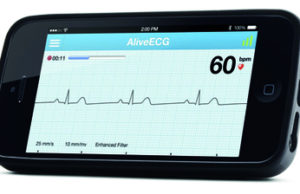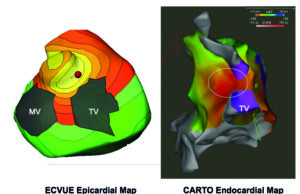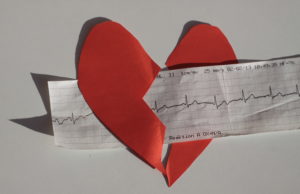Tag: sudden cardiac death
Use of antidepressant medication linked to substantial increase in sudden cardiac...
The use of antidepressant (AD) medications has been linked to a substantial increase in the risk of sudden cardiac death (SCD), as per research...
PROFID EHRA: A landmark trial attempting to redefine prevention of sudden...
In a Cardiac Rhythm News guest article, chief investigators Nikolaos Dagres and Gerhard Hindricks (both Berlin, Germany) provide a window into the PROFID EHRA...
Accurate prediction of sudden cardiac death following heart attack “currently not...
New research published in the European Heart Journal has shown that, among patients who have had a heart attack, it is “extremely difficult” to accurately predict...
Impulse Dynamics announces first implantation of combined CCM and ICD device
Impulse Dynamics has today announced the completion of the first implantation for the INTEGRA-D clinical trial, designed to evaluate the safety and efficacy of...
HRS 2019: MADIT trials analysis shows decline in sudden cardiac deaths...
Valentina Kutyifa (Rochester, USA) discusses the late-breaking study findings looking at data from the family of MADIT (Multicenter Automatic Defibrillator) trials.
Kutyifa told Cardiac Rhythm...
Making a case for cardiovascular genetic testing in patients who survive...
Sudden cardiac arrest remains a major cause of death among young people. Babken Asatryan outlines his research into the genetic basis of the disease,...
More research needed to justify continued use of wearable cardioverter defibrillator...
Ahmad Masri (Heart and Vascular Institute, University of Pittsburgh Medical Center, Pittsburgh, Pennsylvania, USA) and others report in JACC: Clinical Electrophysiology that a systematic...
The top 10 takeaways from the 2017 AHA/ACC/HRS guidelines
In October 2017, the American Heart Association/American College of Cardiology/Heart Rhythm Society (AHA/ACC/HRS) released a guideline document on the management of patients with ventricular...
New guidelines on ventricular arrhythmias and sudden cardiac death
The American College of Cardiology (ACC), along with the American Heart Association (AHA) and the Heart Rhythm Society (HRS) has published new guidelines for...
Familial screening after sudden death in young patients is effective even...
Pauline Quenin (I’institut du thorax, INSERM, CNRS, UNIV Nantes, CHU Nantes, Nantes, France) and others report in Circulation Arrhythmia and Electrophysiology that a quarter...
AliveCor and Mayo Clinic announce collaboration to develop artificial intelligence technology...
AliveCor has announced a collaboration with Mayo Clinic to develop tools for medical and non-medical personnel to easily screen for long QT syndrome (LQTS)...
European network created to find sudden cardiac arrest causes and treatments
A European network—the European Sudden Cardiac Arrest network (ESCAPE-NET)—has been created to find sudden cardiac arrest causes and compare treatments. In Europe, around 20%...
HRS 2017: New implantable string subcutaneous defibrillator shows promise for sudden...
The use of a novel implantable string subcutaneous defibrillator (ISSD, Newpace) that has no can, and has been designed to be placed without the...
HRS 2017: S-ICDs successful despite a range of comorbidities, and across...
Initial real-world experience with the S-ICD (subcutaneous implantable cardioverter defibrillator) in the USA show that implant success rate is high and short-term complications acceptably...
HRS 2017: Long detection in single chamber ICDs cuts mortality and...
Unnecessary shocks and all-cause mortality are reduced in patients treated with a single chamber implantable cardioverter defibrillator (ICD) programmed with a long detection window.
Lead...
MADIT S-ICD global study enrols first patient to assess sudden cardiac...
Boston Scientific has initiated a worldwide study (MADIT S-ICD) that will evaluate the survival benefit of patients treated with the Emblem MRI Subcutaneous Implantable...
Modular cardiovascular device communication: A step towards artificial intelligence to treat...
The implantable cardioverter defibrillator (ICD) is a well-established therapy for the prevention of sudden cardiac death. However, it is still associated with complications over...
Advances in non-invasive imaging to treat ventricular tachycardia and prevent sudden...
We are standing at a crossroads of non-invasive imaging technologies in the field of electrophysiology. Advances in cardiac magnetic resonance imaging (CMRI) mean that...
Interview with Richard Schilling ‒ president-elect of the British Heart Rhythm...
Cardiac Rhythm News speaks to Richard Schilling (St Bartholomews & The Royal London Hospital, London, UK), president-elect of BHRS (2017‒2019), about his objectives during...
Heart Rhythm Congress (HRC) calls for urgent action to prevent thousands...
Heart Rhythm Congress (HRC), the UK’s largest educational congress devoted solely to heart rhythm disorders will gather over 3,000 heart rhythm experts and healthcare...
Higher thyroid hormone levels linked to sudden cardiac death
Risk of death from a sudden loss of heart function has been found to be significantly greater in patients free thyroxine (FT4) levels at...
ESC 2016: Rethink of ICD implantation in non-ischaemic heart failure may...
Implantable cardioverter-defibrillators (ICDs) do not improve overall long-term survival compared to medical treatment in patients with non-ischaemic systolic heart failure, according to results of...
First risk score developed for preventing sudden cardiac death in the...
Researchers in the USA have identified the first generalisable risk score for sudden cardiac death. This prediction model, the researchers argue, provides well-calibrated, absolute...
Automated external defibrillator accessibility: Barrier during cardiac arrest
There is just a one in five chance that a potentially life-saving automated external defibrillator (AED) will be nearby when someone experiences cardiac arrest...
Sudden cardiac death is the most common cause of death in...
An analysis from the ENGAGE AF-TIMI 48 trial has found that sudden cardiac death was the single most common cause of death and accounted...

























